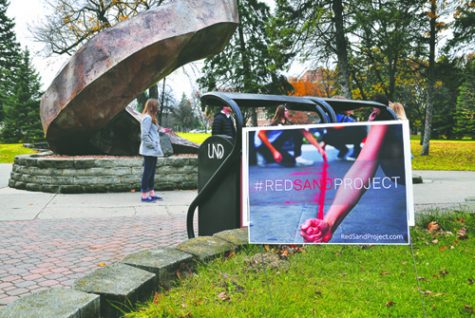Protests continue

Dakota Student / Nicholas Nelson
President Barack Obama delivers remarks before signing H.R. 2576, the Frank R. Lautenberg Chemical Safety for the 21st Century Act, as Dr. Lisa Huguenin and her husband, Marc, and son, Harrison, look on (reflected in mirror), in the Eisenhower Executive Office Building South Court Auditorium, June 22, 2016. (Official White House Photo by Pete Souza)
President’s order halts construction
The Standing Rock Sioux Tribe has been making strides in the Dakota Access Pipeline battle since Friday. On September 9, U.S. District Judge James Boasberg denied the tribe’s request to have the construction of the pipeline come to a halt.
Within an hour of this ruling, the Obama Administration stepped in and gave an order to the company, Energy Transfer Partners, to temporarily stop all work within 20 miles east and west of Lake Oahe.
According to ABC News, the tribe’s request for a halt was because the pipeline crosses over sacred land and burial sites north of their reservation and it has potential of leaking oil into Lake Oahe, the reservation’s main source of drinking water.
Vox stated that technically this land is not owned by the Standing Rock Sioux Tribe, where the tribe responded with that it was taken away from them years ago. Also, the tribe questioned the route of the pipeline, because it was supposed to run farther north, near Bismarck, but officials moved this route because of the fear that a possible leak would harm the state capital.
Carrying around 500,000 barrels of crude oil per day from North Dakota to Illinois, and across multiple water sources, many people expressed a fear of leaks. But according to the Dakota Access Pipeline’s website, they are using upgraded pipeline technology to reduce the risk of any leaks. Also, once a leak or some sort of damage is detected, a worker can access any point of the pipeline within three minutes and stop any further damage to the pipe and the environment.
The temporary stop wasn’t the news the Native Americans were hoping to hear, but it was a good start.
“It’s kind of a victory because it’s halted,” said Tyson Jeannotte, a member of the Turtle Mountain Band of Chippewa Tribe said in an interview with ABC. Jeannotte was at the Sacred Stone camp, the area where Native Americans have been gathering to protest, on the morning of September 9. He stated that it was very peaceful. There were a lot of people singing, laughing, praying and overall just having a good time. “I totally support this movement,” Jeannotte said.
Although Jeannotte wasn’t a part of the Standing Rock Sioux Tribe, he still felt extremely welcomed. ABC News stated there were hundreds of flags representing different tribes at the Sacred Stone camp. “It’s great to see Native American communities come together.” Jeannotte said
The outlook isn’t very good for the Native Americans, especially the people of the Standing Rock Sioux Tribe.
“This issue’s surrounded by money,” said Jeannotte.
ABC News reports that the stoppage of the construction would cost an approximated $1.4 billion in the first year. This would mostly be due to the lost revenue used hauling the crude oil by train. With only 3 percent of the pipeline being halted, and the rest still being constructed, he believes that the halt will remain what it is: temporary, which is unfortunate for the Native Americans.
Rachel Cox is a staff writer for The Dakota Student. She can be reached at [email protected]











